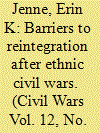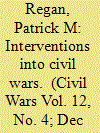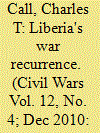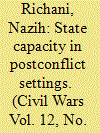| Srl | Item |
| 1 |
ID:
101342


|
|
|
|
|
| Publication |
2010.
|
| Summary/Abstract |
This article evaluates the record of minority return in Croatia, Bosnia and Kosovo to assess the viability of ethnic reintegration in the wake of protracted sectarian violence. Comparative analysis reveals that the logic of post-war ethnic spoils has greatly limited the success of such programmes. What success has been achieved is largely due to third party efforts to disrupt patronage networks and challenge post-war authorities. I conclude that these factors are more significant barriers to reintegration than inexorable ethnic hatreds and fears derived from memories of war. Because such barriers are more readily overcome than entrenched grassroots hostilities, there may be more hope for reintegration than previously thought. However, the systematic failure of the international community to protect and assist prospective minority returnees suggests that continued scepticism of post-war reintegration is in order.
|
|
|
|
|
|
|
|
|
|
|
|
|
|
|
|
| 2 |
ID:
101343


|
|
|
|
|
| Publication |
2010.
|
| Summary/Abstract |
In this article, we ask how far armed conflicts in the Virunga Region directly and indirectly contribute to the extinction of the Great Apes and the critically endangered Mountain Gorilla in specific. We introduce the conflict situation in the Democratic Republic of the Congo and the concept of 'New Wars' in order to identify mechanisms linking armed conflict with the situation of these animals. Contrary to prior research, our empirical analysis draws a more complete and up-to-date picture. Latest available data on the animals' distribution and Red List Status are combined with new (geographically disaggregated) conflict data that include low-level as well non-state fighting. We conclude with some policy implications.
|
|
|
|
|
|
|
|
|
|
|
|
|
|
|
|
| 3 |
ID:
101345


|
|
|
|
|
| Publication |
2010.
|
| Summary/Abstract |
The last decade has generated a robust study on the role of external interventions into civil wars. This literature builds on a rather small but influential foundation that at minimum pointed in the direction for a more systematic exploration for the conditions that lead to effective interventions. After a decade or more of research, it seems appropriate to take stock of where we have gone, what our results tell us, and how we might further advance this important theoretical and policy issue. In this review, I summarize and evaluate the large N, broadly cross-national studies on the conditions that lead to external interventions, and the conditions that lead to their success. I follow this with a discussion of how best to advance our understanding and move the research process forward.
|
|
|
|
|
|
|
|
|
|
|
|
|
|
|
|
| 4 |
ID:
101341


|
|
|
|
|
| Publication |
2010.
|
| Summary/Abstract |
Scholars of peacebuilding are increasingly moving beyond questions of how to reach negotiated settlements to how an apparently stable postwar peace can be consolidated. Liberia offers a good case study, as its civil war of 1990-96 seemed to have concluded with an internationally supported election in 1997 and the withdrawal of international peacekeeping forces. Yet it experienced renewed warfare involving many of the same actors by 2000. What explains the failure of Liberia's peace? Recent research on civil wars has emphasized the causal role of poverty, natural resource dependency, and weak state institutions. Although Liberia reflects many of these factors, I argue here that grievance and exclusionary behavior underlie Liberia's civil war recurrence. These findings suggest that national actors and international peacebuilders should focus strategies on addressing postwar elected governments' exclusionary conduct toward former enemies.
|
|
|
|
|
|
|
|
|
|
|
|
|
|
|
|
| 5 |
ID:
101344


|
|
|
|
|
| Publication |
2010.
|
| Summary/Abstract |
This article proposes a systemic approach to explore the determinants of homicides. This approach examines two interrelated factors: a) the interplay between state capacities and the opportunity costs of crime; and b) consequently, the political economy of this interplay. In this article I argue that weakened state capacities in the postconflict period in El Salvador and Guatemala have helped in the creation of a systemic relationship interlocking states' agents and criminal organizations in a modality that perpetuates high rates of homicides. My purpose in this article is to discern core elements of this systemic relationship, its dynamics, and political economy and to answer: what is maintaining the system?
|
|
|
|
|
|
|
|
|
|
|
|
|
|
|
|